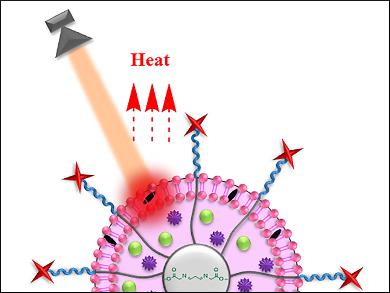Drug delivery of anticancer compounds is a fast-growing and important field of research. By facilitating the controlled release of chemotherapy drugs, cancer cells can be selectively treated. Biodegradable nanoparticles are often used as drug-delivery devices for such purposes.
Baiwang Sun, Southeast University, Nanjing, China, and colleagues have developed nanoparticles which degrade upon exposure to a near-infrared laser and acidic conditions. This combination of conditions was used to release cisplatin, a commercial chemotherapy drug, in specific locations. This effect was used to induce apoptosis (programmed cell death) in MCF-7 and SK-BR-3 human breast cancer cell lines.
The nanoparticles are composed of a crosslinked poly(ethylene glycol) and poly(ε-caprolactone) block copolymers, and a biodegradable lecithin polymer doped with polyaniline. Herceptin, an antibody specific to the HER2 receptor expressed within breast cancer cells, was bound to the surface of the nanoparticle as a targeting agent.
The team tested the carrier systems containing cisplatin on the cell lines and found that irradiating the sample with a near-infrared laser could increase the amount of cisplatin released from 11.33 % to 82.64 % over 12 hours at pH 7.4. This effect could be improved by lowering the pH to 5.5, at which 99.78 % of cisplatin was released within 5 minutes, thereby increasing cell death. This result is encouraging, considering that the internal environment of cancer cells is usually acidic.
- Near-Infrared Light and pH Dual-Responsive Targeted Drug Carrier Based on Core-Crosslinked Polyaniline Nanoparticles for Intracellular Delivery of Cisplatin,
Chaoqun You, Hongshuai Wu, Minxing Wang, Yawen Zhang, Jingwen Wang, Yanghui Luo, Lihai Zhai, Baiwang Sun, Xiangyang Zhang, Jin Zhu,
Chem. Eur. J. 2017, 23, 5352–5360.
DOI: 10.1002/chem.201700059




